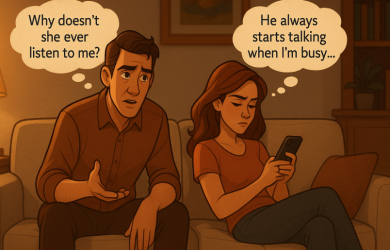When Your Spouse Won’t Talk

Key Takeaways
Marriage.com AI Quick Summary
“Can we talk?” This is a familiar statement among couples. Communication is important in any relationship, whether at home or work, but in order for communication to do its work of clearing up conflicts and deepening understanding, both people must talk.
Often that is not the case. Often one person wants to talk and the other wants to avoid talking. People who avoid talking give reasons for not talking: they don’t have the time, they don’t think it will help; they think their spouses or mates just want to talk so they can control them; they see their spouse’s desire to talk as nagging or some neurotic demand for attention.
Why won’t people communicate?
Sometimes people who won’t talk are workaholics who believe in action, not talking, and their whole lives are thus spent in working or doing other projects. Sometimes, they are angry and are holding back because they bear some grudge against their partner. Sometimes they agree to talk but are only going through the motions to appease their partners; hence no real progress occurs.
However, the leading cause of people not wanting to talk is that they don’t want to give up being right.
Confucius once said,
“I have traveled far and wide, and I have yet to find a man who could bring home the judgment against himself.”
It appears that most people want to see things their way, and they are not interested in any talk that may result in their having to give up their precious point of view. They are only interested in winning not in the give-and-take of truly authentic communication.
This is not only true of partners who don’t want to talk.
Partners who do want to talk are often only interested in persuading their significant other that they are right, in the guise of having an “open” discussion.
This can be another reason why their partner doesn’t want to talk. In this case, the partner who wants to talk is only pretending but in reality doesn’t want to talk (engage in a constructive dialogue) at all. The bottom line is that the person who doesn’t want to talk could either be the person who refuses to talk or the person who pretends to want to talk.
There are two aspects of this problem:
(1) identifying the person who doesn’t want to talk,
(2) getting that person to talk.
The first aspect may be the hardest. In order to identify the person who doesn’t want to talk you; you have to be willing to look at yourself objectively. If, for example, you are the person who wants to talk, it will be hard for you to identify that you are not really motivated to talk so much as to get your partner to see your point of view and listen to your demands about changing his or her behavior.
If you are the person who continually refuses to talk, it will be equally hard for you to give up your excuses. You will think that your reasons for not talking are completely justified and will be unwilling to even think about or examine them.
“Every time we talk it just leads to an argument?” you’ll say, or, “I don’t have time for this!” or, “You just want blame everything on me and demand that I change.”
Look at yourself objectively
This requires more courage than jumping from a blazing fire. That is because when you jump in a blazing fire, you know what is involved, but in trying to look at yourself objectively, you are confronted with your own unconscious. You think you are looking at yourself objectively and you know what’s what.
Freud was the first psychologist to suggest that most of our mind is unconscious. So it is making conscious what is unconscious that is the hard part of looking at yourself objectively.
Similarly, people who refuse to talk must also look at themselves objectively. So for each partner, the one who refuses to talk and the one who pretends to want to talk, both must first be able to take that first step in identifying if they truly want to talk or why they don’t want to talk.
If you’re the partner who wants to talk and have long looked for a way to get your partner to talk, the first step then is to look at yourself. What may you be doing to cause him not to talk? The best way to get somebody to talk who doesn’t want to talk is to start by taking responsibility for your own contribution to the matter.
“I guess you don’t want to talk because you think I’m just going to make a lot of accusations or demands if we talk,” you may say. You are demonstrating empathy and may therefore indicate that you are in tune with the other person.
If you’re the person who refuses to talk, you may try a similar tactic. When your partner says, “Let’s talk,” you may reply, “I’m afraid to talk. I’m afraid I may have to give up being right.” Or you may say, “I understand you feel I don’t listen to you, but I’m afraid to talk because in the past I experienced you as wanting to prove you are right and I’m wrong.”
The word “experienced” is important here because it keeps the conversation subjective and lends itself to further dialogue. If you said, “I’m afraid to talk because in the past you always want to prove me wrong and yourself right.” Now the statement comes across more like an accusation and doesn’t lead to dialogue and resolution.
To get someone to talk who doesn’t want to talk, you have to first talk in a way you don’t want to talk—that is empathize with your partner rather than trying to manipulate. To get someone to stop pretending to talk, you need to empathize with that partner and demonstrate the intent to give and take.
Yes, it’s hard. But no one said relationships are easy.
 Tips
Tips
Write your tip or submit a video tip
All tips are reviewed before the publishing.
Share this article on
Want to have a happier, healthier marriage?
If you feel disconnected or frustrated about the state of your marriage but want to avoid separation and/or divorce, the marriage.com course meant for married couples is an excellent resource to help you overcome the most challenging aspects of being married.
Related Articles
Recent Articles
Related Quizzes
Unlock Daily 30-Sec Tips for a Happier, Healthier Relationship
👉 Subscribe FREE on YouTube We'd love your feedback!
We'd love your feedback!
 Expert Q&A
Expert Q&A
Ask your question related to this topic & get the support you deserve from experts.


















 Thanks for your feedback!
Thanks for your feedback!